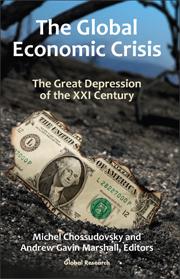The Global Economic Crisis: The Great Depression of the XXI Century.
Review of Book by Michel Chossudovsky and Andrew Gavin Marshall

You want to read The Global Economic Crisis if you meet these criteria: you welcome information and analysis about critically important issues that come from great thinkers outside the mainstream media and publishing world; you can handle brain pain from detailed and brutally honest revelations; you are willing and able to challenge your own biases and preconceptions to let in new explanations of how the world really functions.
If millions of Americans read this book, we would probably see a far stronger uprising against the political establishment that has refused to severely punish the countless guilty people in the financial, banking and mortgage sectors that brought down the US and global economic system.
This book ties together a large number of factors in 20 chapters that reveal just how corrupt the world has become because of the power of plutocratic, wealthy and corporate interests. From Wall Street corporate boardrooms to the Federal Reserve and other central banks to the US military and NATO, a multitude of threads get woven into a disturbing tapestry of crimes against society that still have not been prosecuted.
This book is truly an instrument of anti-brainwashing. If you are willing to spend serious time reading it, then you surely will become much angrier about the dismal state of the economy that is causing so much pain and suffering to ordinary people worldwide. If you personally have escaped the worst ravages of the economic meltdown, then you will have much more compassion for those severely affected.
In all honesty, if the current global economic crisis has made you angry, pessimistic, fearful, despairing and worse, then this book will most likely exacerbate all such feelings. By revealing still more connections, implications and causes, this book will motivate you to do anything you can to fight the corporate, plutocratic forces devastating the lives of ordinary people. If you already have little confidence in government, it will only make things worse. Does all this mean you should avoid reading it? Absolutely not.
Here are a few statements from the book that resonated with me and that you can use to decide whether the general philosophic orientation of it is compatible with your views:
“Wall Street’s Ponzi scheme was used to manipulate the market and transfer billions of dollars into the pockets of banksters.”
“Government rescue packages around the world are corporatist in their very nature, as they save the capitalists at the expense of the people.”
“The global political economy is being transformed into a global government structure at the crossroads of a major financial crisis.”
Just gin up the courage to read it, get out several color markers to highlight passages and expand your knowledge to overcome all the propaganda constantly being hurled at you. We need more citizen unrest to energize more public protests to overthrow the powers that have corrupted and perverted our government.
A key voice in the mainstream media that is in sync with the painful messages in this book is Dylan Ratigan who has a terrific daily show on MSNBC. He too should read this timely book.

